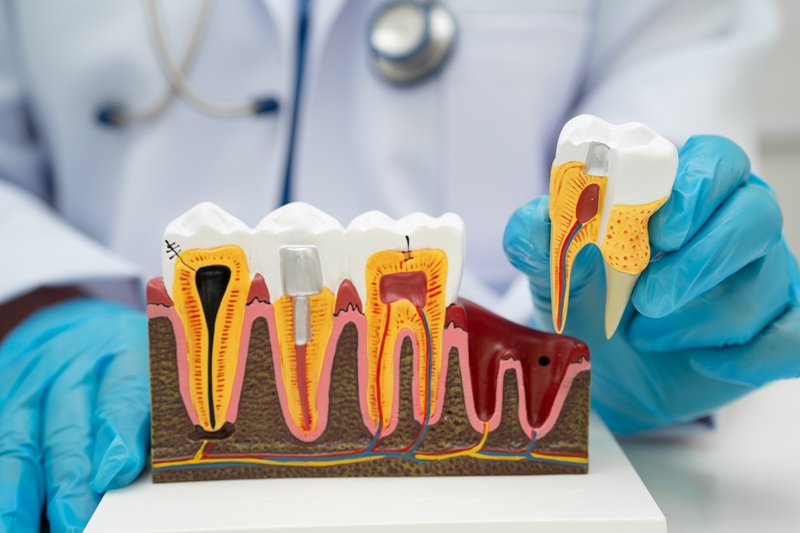Why Do You Need Dental Crowns After a Root Canal Treatment?

After undergoing a root canal treatment, many patients breathe a sigh of relief—finally, the pain is gone, and the tooth is saved! But, it’s important to know that this is not yet the end of your dental journey. In fact, the dentist might recommend one more step: getting a dental crown.
You might be wondering, “Do you need a crown after a root canal?” The answer isn’t always straightforward, but in most cases, yes—a dental crown plays a vital role in protecting your tooth long-term.
Let’s walk you through why a crown after root canal is often essential, what the dental crown procedure involves, and how it helps you maintain a strong, healthy smile.
What Happens to a Tooth After a Root Canal?
When a tooth becomes infected or severely decayed, a root canal treatment is often the best way to save it. This treatment involves removing the infected nerve and pulp from inside the tooth, cleaning it out, and sealing it to prevent future infection.
While this process removes pain and preserves the tooth structure, it also leaves the tooth weaker and more brittle than before. Why? Because the living tissue that once nourished the tooth has been removed. As a result, the tooth becomes more likely to crack or break under everyday pressure—especially molars, which handle most of the chewing.
This is where dental crowns come in.
Why Is a Dental Crown Often Needed After a Root Canal?
1. To Protect a Weakened Tooth
After a root canal, the tooth may survive, but it no longer has the same strength it once did. Without a crown, even a simple bite on something crunchy can cause the tooth to fracture. A dental crown acts like a strong helmet over the tooth, protecting it from cracks and breaks.
2. To Restore Tooth Function
Chewing can become tricky if your treated tooth isn’t as strong. A crown after the root canal helps restore the tooth’s full function so you can eat comfortably and confidently again.
3. To Prevent Further Damage or Infection
While the inside of the tooth has been cleaned and sealed, the outer structure may still be vulnerable. A dental crown helps keep out bacteria and reduces the chances of the infection coming back.
4. To Improve Appearance
Root canal-treated teeth can sometimes darken or look different from surrounding teeth. A crown can be custom-made to match your other teeth, restoring both your tooth’s strength and its natural appearance.
Are There Situations Where You Might Not Need a Crown?
In some cases, if the treated tooth is a front tooth and has enough healthy structure left, your dentist might suggest a different option—like a simple filling or veneer. Front teeth generally aren’t exposed to as much pressure as molars, so a dental crown may not always be necessary.
But for most root canal treatments, especially those on back teeth, getting a crown is strongly recommended. Your dentist will examine the location, strength, and structure of your tooth to determine the best course of action.
What Is the Dental Crown Procedure Like?
Getting a dental crown usually involves two visits to the dentist.
First Visit: Preparing the Tooth
Your dentist will shape the tooth so the crown can fit over it snugly. Then, they’ll take impressions of your teeth to send to the dental lab where your custom crown will be made. In the meantime, a temporary crown is placed to protect the tooth.
Second Visit: Placing the Permanent Crown
Once your custom crown is ready, your dentist will remove the temporary crown and fit the permanent one in its place. They’ll check the fit, make sure your bite feels right, and then bond the crown securely to your tooth.
At Whitehorse Dental, we ensure the dental crown procedure is comfortable, precise, and designed to restore your smile as naturally as possible.
What Are Dental Crowns Made Of?
Dental crowns can be made from a variety of materials, including:
- Porcelain or ceramic – Great for front teeth due to their natural appearance.
- Metal alloys – Strong and durable, often used for molars.
- Porcelain-fused-to-metal – Offers both strength and aesthetic appeal.
Your dentist will help you choose the best type of crown based on the tooth’s location and your specific needs.
How Long Will a Dental Crown Last?
With proper care, a dental crown can last anywhere from 10 to 15 years or even longer. To make your crown last:
- Practice good oral hygiene by brushing and flossing daily.
- Avoid chewing on hard items like ice or pens.
- Visit your dentist regularly for check-ups and cleanings.
Do You Really Need a Crown After a Root Canal?
Let’s put it this way—getting a dental crown after a root canal treatment isn’t just an extra step. It’s a crucial part of the healing process.
Think of it as sealing the deal. The root canal saves your tooth; the crown protects and strengthens it for the future.
Skipping the crown can leave your treated tooth vulnerable to damage, leading to more dental work—or even loss of the tooth—down the track. That’s why dentists often recommend a crown after root canal, especially for back teeth.
Undergoing a root canal treatment is a smart way to save a damaged tooth, but it’s only half the solution. Without a protective dental crown, your tooth remains at risk of cracking or failing.
Ready to Take the Next Step Towards a Healthier Smile?
If you’re asking yourself, “Do you need a crown after a root canal?”—the answer is, in most cases, yes.
Your smile deserves the best long-term protection. If you’ve recently had a root canal and are thinking of getting a dental crown, you can talk to our team at Whitehorse Dental about your options.
Book an appointment today and get personalised insights that will help you decide whether a dental crown is right for you—and ensure your smile stays strong for years to come!




